
Jamie Bell
Jamie Bell (jbell@astc.org) is a Senior Advisor at ASTC. For more than a decade, he served as Project Director and Principal Investigator for the Center for Informal Science Education (CAISE), which was based at ASTC. He received ASTC's highest honor, the ASTC Fellow Award for Outstanding Contribution in 2022.
Events like the Association of Science and Technology Center’s (ASTC) Annual Conference are where knowledge exchange occurs through panel and workshop sessions, inspiring keynotes, and one-on-one conversations that are often the catalysts for collaborations and partnerships. Extended experiences like staff exchanges, residencies, and fellowships offer additional in-depth opportunities for science center and museum professionals to observe first-hand how colleagues at other institutions think about and operationalize their approaches to designing engaging experiences and settings, and to share and compare what they are learning about how to best serve their their audiences and communities.
During the summer of 2024 I had the privilege and pleasure to work with the Copernicus Science Center in Warsaw, Poland, as a Fulbright Specialist. The Fulbright Specialist Program provides support for academics and established professionals to engage in two-to-six-week, project-based exchanges at host institutions across the globe. The program leverages the knowledge and experience of U.S. experts in a wide range of fields to co-develop and serve on projects that will advance the host institution’s practice and goals, while providing professional and cultural learning experiences for Specialists. Keep reading to learn about my Fulbright experience, as well as those of others in our field have had in Finland, Paraguay, and Australia.
Improving the Quality of Informal Learning: My project at the Copernicus Science Center in Warsaw, Poland
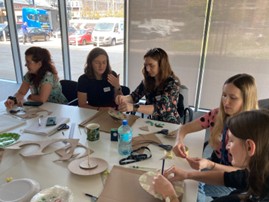
Established in 2010, the Copernicus Science Center is a flourishing institution that in addition to welcoming a million local visitors per year, also serves communities throughout Poland in 41 smaller Areas of Imagination, Discovery, and Activity that offer exhibits, learning activities, and maker spaces. The Center also co-sponsors an annual summer “Science Picnic” at the National Stadium, where last year they welcomed 35,000 attendees who participated in a wide variety of first-hand experiences with phenomena and new technologies.
My project, “Improving the Quality of Informal Learning,” evolved from conversations with Copernicus senior staff at the 2022 European Network of Science Centers and Museums (Ecsite) conference about our current interests, challenges, and plans. The center had recently added a new research facility- “The Copernican Revolution Workshop”- in which classrooms, conference rooms, and workshops provide spaces for experimentation and prototyping, away from the exhibition floor. This development piqued my long-held passion for and previous experience in developing programs and learning activities. In follow-up communications, the staff and I identified related areas of work where my expertise might add value. We landed on a project idea in which I would be embedded in the Operations Department and have the opportunity to work with staff who design activities and training, as well as those who interact directly with visitors and program participants.
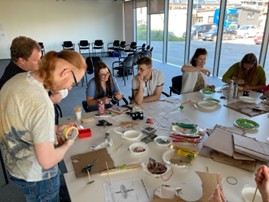 I spent my first week at Copernicus observing recruitment, training, and professional development practices, and meeting with senior staff to understand organizational structure and functions and how they serve the learning and engagement goals for exhibits, programs, and activities. By week 2 I was ready to ask questions and probe the theory of action that informed the center’s strategies and practices. Leadership suggested that I facilitate an all-staff weekly presentation/discussion on topics such as exhibit development and mediation- i.e. how center staff known as hosts, animators, and inspirators engage individuals and groups in meaningful interactions- as a way of sharing my related experience while learning more about what informs the staff’s approaches. These sessions proved to be elicitive of staff’s current thinking and work, as well as catalytic for discussing ongoing questions and challenges that all science centers and museums grapple with in their desire to continuously improve and enhance their visitors’ and program participants’ experiences. In the process I learned about Copernicus’ practice of building skills such as question-raising into floor staff training and of integrating art into the development of innovative exhibitions such as “The Future is Today”.
I spent my first week at Copernicus observing recruitment, training, and professional development practices, and meeting with senior staff to understand organizational structure and functions and how they serve the learning and engagement goals for exhibits, programs, and activities. By week 2 I was ready to ask questions and probe the theory of action that informed the center’s strategies and practices. Leadership suggested that I facilitate an all-staff weekly presentation/discussion on topics such as exhibit development and mediation- i.e. how center staff known as hosts, animators, and inspirators engage individuals and groups in meaningful interactions- as a way of sharing my related experience while learning more about what informs the staff’s approaches. These sessions proved to be elicitive of staff’s current thinking and work, as well as catalytic for discussing ongoing questions and challenges that all science centers and museums grapple with in their desire to continuously improve and enhance their visitors’ and program participants’ experiences. In the process I learned about Copernicus’ practice of building skills such as question-raising into floor staff training and of integrating art into the development of innovative exhibitions such as “The Future is Today”.
While observing daily operations and preparing presentations I had a chance to reflect on my own values and beliefs about what constitutes “quality informal learning,” and the first principles I’ve observed over the years working with a variety of institutions and organizations. These include always starting from authentic, compelling phenomena, eliciting and attending to learners’ relevant knowledge, experience, and curiosity, and creating the conditions and space for following audiences’ own paths of inquiry as they engage with our offerings. In order to investigate this last principle more deeply the Operations department leadership and I decided to conduct a Comparing Approaches workshop with all education staff. The workshop is the first in a series of Fundamentals of Inquiry workshops developed by the Exploratorium in San Francisco, and invites participants to experience and reflect on different approaches to hands-on learning about spinning tops. Collaborating on this activity became a way for the Copernicus staff and I to develop a shared language about the characteristics, uses, and trade-offs of different approaches to facilitating learning in science center and museum programs. Finding these “sweet spots” of mutual interest and curiosity is key for the success of these types of exchanges, residencies, and fellowships, and something that programs like Fulbright allow the time and space for participants to experience.
Shared Learning to Shape an Inclusive Future: Rae Ostman and Paul Martin’s project at Heureka in Vantaa, Finland
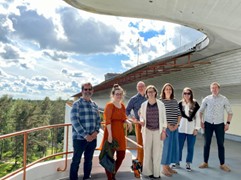
In a project titled “Shared Learning to Shape an Inclusive Future,” Heureka, the science center in Vantaa, Finland hosted Fulbright Specialist Rae Ostman and her colleague Paul Martin from May to June 2022. Paul and Rae co-direct the Center for Innovation in Informal STEM Learning (CIISL) at Arizona State University (ASU) and are leaders of the National Informal STEM Education Network (NISE Network). The genesis of the project grew from Heureka’s interest in helping to build science capital through the Fostering Finnish Science Capital research consortium (FINSCI) and CIISL and NISE Network’s interest in how Heureka and other Finnish science centers and museums are engaging learners in futures thinking.
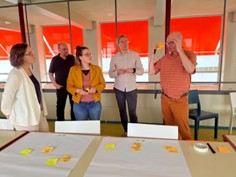 Rae and Paul’s experience and expertise in building the NISE Network–with hundreds of science centers and other informal learning organizations across the US–provided opportunities for sharing and comparing strategies for building, nurturing, and growing science center and museum networks. They worked with Heureka and the Association of Finnish Science Centers to share and analyze network strategies and practices, with a specific focus on how they can help to build equitable and sustainable futures. This work included visits to multiple members of the Association to learn about their organization, gather knowledge about their understanding of their expertise and roles in the network, and reflect on the added value of network functions in achieving its goals.
Rae and Paul’s experience and expertise in building the NISE Network–with hundreds of science centers and other informal learning organizations across the US–provided opportunities for sharing and comparing strategies for building, nurturing, and growing science center and museum networks. They worked with Heureka and the Association of Finnish Science Centers to share and analyze network strategies and practices, with a specific focus on how they can help to build equitable and sustainable futures. This work included visits to multiple members of the Association to learn about their organization, gather knowledge about their understanding of their expertise and roles in the network, and reflect on the added value of network functions in achieving its goals.
The project culminated in a final two-day seminar led by Rae and Paul, which integrated observations and outcomes from workshops and other engagement activities held throughout their visit with insights from their experiences building and sustaining the NISE Network. Major takeaways for Rae and Paul included the value of a STEM learning ecosystem approach to building science capital and lessons learned from how Heureka and the FINSCI partners are fostering futures-thinking and addressing sustainability and other current topics using strategies such as storytelling.
Mobile Science Lab and Museum in Asunción, Paraguay
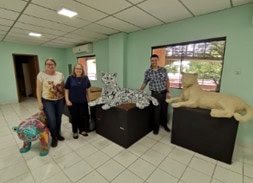
Denise Dumas LeBlanc, former Director of Learning Experiences Discovery Museum in Acton, MA served as a Fulbright Specialist with Paraguay’s National Council of Science and Technology (CONACYT) on two, 2-week visits in November 2023 and October 2024 to contribute to the design of interactive exhibits and experiences for their Mobile Museums and Labs program. The program was created to bring Science, Technology, Engineering, Art, and Math (STEAM) activities to students and families throughout the country. Denise’s work focused on creating advisory panels with professors, researchers, and teachers, conducting surveys with stakeholders such as universities, schools, community organizations, and identifying STEAM topics and activities to pilot and prototype with partners.
Denise’s work and experience in accessible exhibit and program development complemented the CONACYT team’s knowledge of the national curriculum and their network of stakeholders’ reach to create engaging, modular learning experiences for their communities. While conducting this work CONACYT’s initial ‘mobile’ plan for serving rural areas expanded with an opportunity to add a 3,000 square meter multipurpose exploration center in Asuncion (Paraguay’s capital) that will include a library, recording studio, coworking spaces and a café. Currently under development, it will be the first interactive public space in Paraguay dedicated to bringing free STEAM experiences to students and families and will be flexible enough to host lectures and workshops. Denise participated in the selection process for the design team for these “Metaphoric Spaces,” drawing on her expertise in flexible and durable design.
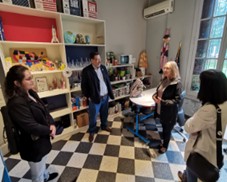 Among Denise’s many takeaways were that the “spirit of inquiry and exploration” is alive and thriving with everyone she worked with, from high school science fair participants, to educators and university researchers, and the inspiration she took from Paraguayan and Guarani culture and Paraguay’s unique natural resources and geology. Since leaving, Denise continues to consult on the project remotely as a volunteer. CONACYT has written about working with Denise here.
Among Denise’s many takeaways were that the “spirit of inquiry and exploration” is alive and thriving with everyone she worked with, from high school science fair participants, to educators and university researchers, and the inspiration she took from Paraguayan and Guarani culture and Paraguay’s unique natural resources and geology. Since leaving, Denise continues to consult on the project remotely as a volunteer. CONACYT has written about working with Denise here.
Digital Futures for Museum Visitors in Melbourne, Australia
In February 2024 Claire Pillsbury, former Associate Director of Exhibit Content Development, California Academy of Sciences, began a two week project “Digital Futures for Museum Visitors”, with the Australian Center for the Moving Image (ACMI) and the Royal Melbourne Institute of Technology (RMIT) University. Claire had worked with ACMI, and RMIT staff to develop the project proposal based on shared interests in integrating research into interpretive practice in museums and using an interdisciplinary approach to spark new perspectives. The plan included formal talks and presentations, workshops, advising graduate students, giving feedback on exhibitions, discussing education programs, and exploring the appeal of post-visit digital tools.
Claire’s agenda included serving as a panelist at ACMI’s two day Future of Arts, Culture, and Technology symposium. The panel session was provocatively titled “Not Another Lab” and examined the role of Research and Development labs in cultural institutions such as libraries, museums, and science centers. At RMIT, Claire gave an evening talk about “The Future of Museums” for students, faculty, and interested individuals. She also led one workshop on observation methods for museum professionals and another workshop on research methods for RMIT students. While clearly complex to coordinate, the ongoing collaboration between the university community of RMIT with ACMI’s staff and film community was also very productive for both institutions. For example an ideation session about a post visit digital tool involved both ACMI film screening attendees and RMIT scholars brainstorming together about digital features that might attract and add value.
Among the highlights of her experience were the opportunity to experience the excellent digital immersive exhibition “Works of Nature” at ACMI, learn about current research of RMIT graduate students, and discuss longitudinal evaluation research about usage of ACMI’s unique “Lens”, an RFID embedded card that allows visitors to “collect” with a swipe and then explore their online collection at home.
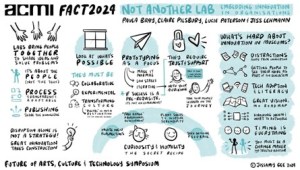
Conclusion
Science centers and museums, as well as other educational organizations dedicated to engaging people in science, technology, engineering, and math (STEM) share a belief in the power and potential of STEM research and learning to create a healthy, thriving planet. Each place is unique, however, in how regional and community context, staff expertise and experience, and leadership philosophy shape institutional culture, practices, and strategies and approaches for achieving impact. This variety makes the what, why, and how of exhibit, program, and activity development rich with inter-institutional learning opportunities.
My experiences and those of my colleagues who have also served as Fulbright Specialists expanded our awareness of the rich range of approaches that international institutions and organizations are taking to designing informal STEM learning experiences. And as Claire noted, “while our institutions often valorize originality, it is not often acknowledged that our ‘innovative’ approaches are continuously fueled by the cross pollination of learning from and building on each other’s work. Our field can progress further with the support and inspiration these focused exchanges provide and give us access to a larger palette than we would if working in isolation”.
More information about the Fulbright Specialist program can be found here.

